奥运会的故事【英文】
- 格式:pps
- 大小:5.74 MB
- 文档页数:19
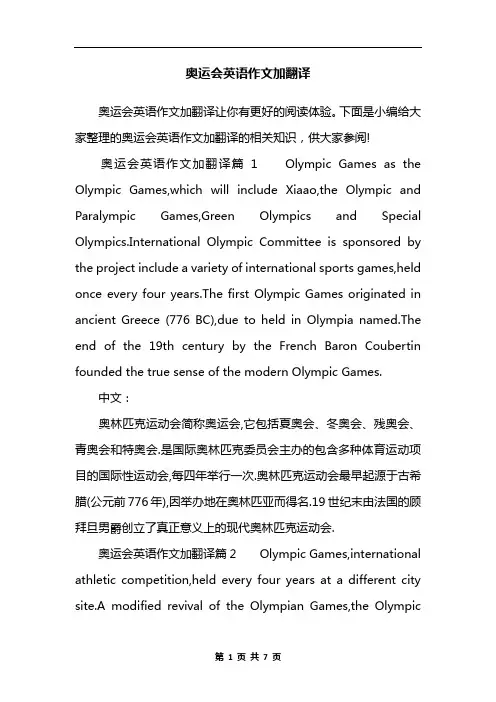
奥运会英语作文加翻译奥运会英语作文加翻译让你有更好的阅读体验。
下面是小编给大家整理的奥运会英语作文加翻译的相关知识,供大家参阅!奥运会英语作文加翻译篇1 Olympic Games as the Olympic Games,which will include Xiaao,the Olympic and Paralympic Games,Green Olympics and Special Olympics.International Olympic Committee is sponsored by the project include a variety of international sports games,held once every four years.The first Olympic Games originated in ancient Greece (776 BC),due to held in Olympia named.The end of the 19th century by the French Baron Coubertin founded the true sense of the modern Olympic Games.中文:奥林匹克运动会简称奥运会,它包括夏奥会、冬奥会、残奥会、青奥会和特奥会.是国际奥林匹克委员会主办的包含多种体育运动项目的国际性运动会,每四年举行一次.奥林匹克运动会最早起源于古希腊(公元前776年),因举办地在奥林匹亚而得名.19世纪末由法国的顾拜旦男爵创立了真正意义上的现代奥林匹克运动会.奥运会英语作文加翻译篇2 Olympic Games,international athletic competition,held every four years at a different city site.A modified revival of the Olympian Games,the OlympicGames were inaugurated in the spring of 1896,largely through the efforts of the French sportsman and educator Baron Pierre de Coubertin.This competition evolved into the Summer Olympicsthe subject of this article.The Winter Olympics began in 1924 and were held in the same year as the Summer Olympics until 1994,since when the winter games have alternated with the summer games in even-numbered years.奥运,国际体育竞赛,每四年举行一次,在不同的城市的网站.一种改进的复苏奥神比赛中,奥运会上被正式成立,在1896年的春天,主要是通过努力,法国运动员和教育家男爵皮埃尔德顾拜旦.这种竞争演变成夏季奥运会的主题这篇文章.冬季奥运会开始于1924年,并举行了在同一年,作为夏季奥运会,直到1994年,因为当冬季运动会有交替与夏季奥运会在偶数年.奥运会英语作文加翻译篇3Chinese people always appreciate the purposes and principles of Olympic ideal, support the efforts of Olympic Games to promote world peace. The Chinese Government and people are doing our the utmost/best to prepare for the 2008 Olympic Games in Beijing, and shooting at the pageant with advocating Olympic ideal, sparkpluging world peace and enhancing the relationships among the world. Olympic spirit are gonna spread again in orient cultural ancient China.The government and people of China have always admired the purposes and principles of the Olympic spirit and supported the efforts made by the Olympics in promoting world peace. The Chinese government and people are doing our utmost in preparation for the 2008 Olympics in Beijing. It is our hope to make it a grand gathering that will carry forward the Olympic spirit, promote world peace and enhance the friendship among people of the world, so that the Olympic spirit will flourish once again, this time in China, an oriental country with an ancient civilization.中国人民始终欣赏的宗旨和原则,奥林匹克理想,支持的努力,奥运会上为促进世界和平。
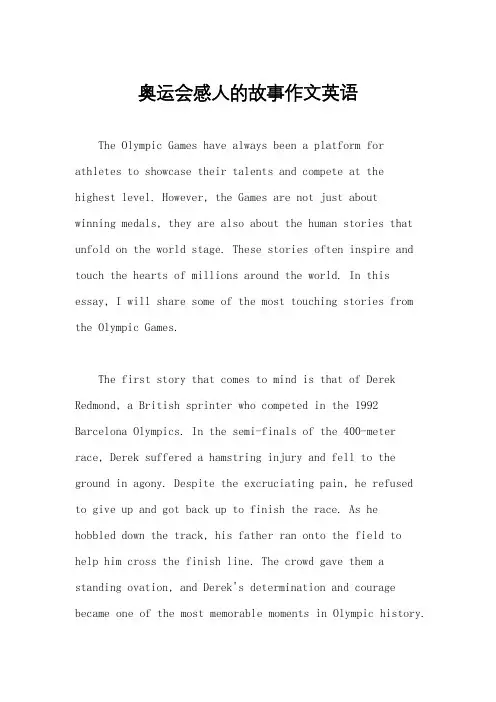
奥运会感人的故事作文英语The Olympic Games have always been a platform for athletes to showcase their talents and compete at the highest level. However, the Games are not just aboutwinning medals, they are also about the human stories that unfold on the world stage. These stories often inspire and touch the hearts of millions around the world. In this essay, I will share some of the most touching stories from the Olympic Games.The first story that comes to mind is that of Derek Redmond, a British sprinter who competed in the 1992 Barcelona Olympics. In the semi-finals of the 400-meter race, Derek suffered a hamstring injury and fell to the ground in agony. Despite the excruciating pain, he refusedto give up and got back up to finish the race. As hehobbled down the track, his father ran onto the field to help him cross the finish line. The crowd gave them a standing ovation, and Derek's determination and courage became one of the most memorable moments in Olympic history.Another inspiring story is that of Kerri Strug, an American gymnast who competed in the 1996 Atlanta Olympics. In the final event, the vault, Kerri injured her ankle on her first attempt. Despite the injury, she decided to make a second attempt to help her team win the gold medal. She landed on one foot and hopped on the other, but managed to stick the landing. She collapsed in pain, but her score secured the gold medal for the United States. Kerri's bravery and selflessness earned her the respect of her teammates and the world.The story of Abbey D'Agostino and Nikki Hamblin is another example of the Olympic spirit. In the 2016 Rio Olympics, the two runners collided during the 5,000-meter race and fell to the ground. Instead of getting up and continuing the race, Abbey helped Nikki to her feet and encouraged her to finish the race. They both finished the race, despite their injuries, and hugged each other at the finish line. Their sportsmanship and kindness inspired people around the world.Finally, the story of Eric Moussambani, a swimmer from Equatorial Guinea, is a reminder that the Olympics are not just for the elite athletes. In the 2000 Sydney Olympics, Eric competed in the 100-meter freestyle event, despite having only trained in a 20-meter hotel pool. He struggled to finish the race, but his determination and effort earned him a standing ovation from the crowd. Eric's story showed that the Olympic spirit is not just about winning, but about participating and giving your best effort.In conclusion, the Olympics are not just about winning medals, but also about the human stories that unfold on the world stage. The stories of Derek Redmond, Kerri Strug, Abbey D'Agostino and Nikki Hamblin, and Eric Moussambani remind us that the Olympic spirit is about determination, courage, sportsmanship, and giving your best effort. These stories inspire and touch the hearts of millions around the world, and they will continue to be remembered for years to come.。
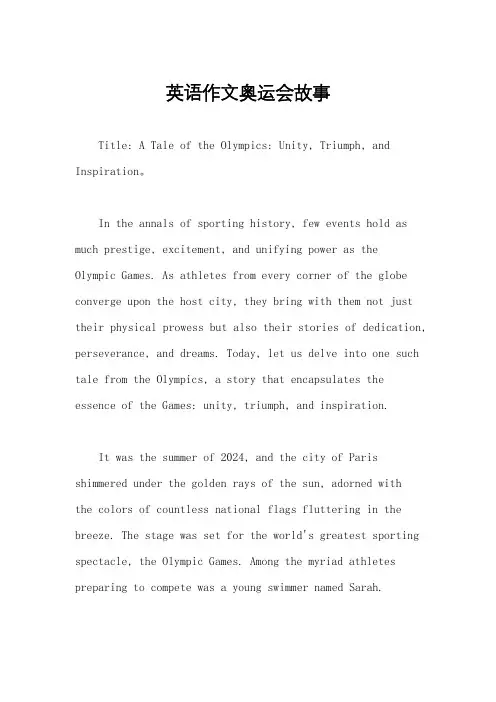
英语作文奥运会故事Title: A Tale of the Olympics: Unity, Triumph, and Inspiration。
In the annals of sporting history, few events hold as much prestige, excitement, and unifying power as theOlympic Games. As athletes from every corner of the globe converge upon the host city, they bring with them not just their physical prowess but also their stories of dedication, perseverance, and dreams. Today, let us delve into one such tale from the Olympics, a story that encapsulates the essence of the Games: unity, triumph, and inspiration.It was the summer of 2024, and the city of Paris shimmered under the golden rays of the sun, adorned withthe colors of countless national flags fluttering in the breeze. The stage was set for the world's greatest sporting spectacle, the Olympic Games. Among the myriad athletes preparing to compete was a young swimmer named Sarah.Hailing from a small town in the heart of America,Sarah's journey to the Olympics was not one of privilege or ease. Raised by a single mother who worked multiple jobs to make ends meet, Sarah learned the value of hard work and determination from an early age. Swimming became her solace, her escape from the challenges of everyday life. With each stroke, she propelled herself closer to her dreams.As Sarah stood on the brink of Olympic glory, shecouldn't help but feel the weight of expectations pressing down upon her slender shoulders. The pool beckoned, its azure depths mirroring the boundless possibilities that lay ahead. But Sarah knew that the path to victory would not be easy. In the lanes beside her, she saw the formidable competitors from powerhouse nations, each vying for the coveted gold medal.The day of the race arrived, and the atmosphere in the aquatics center was electric with anticipation. Sarah stood poised on the starting block, her heart pounding in rhythm with the pulsating energy of the crowd. The starter's gun cracked through the air, signaling the beginning of therace. With a powerful thrust, Sarah plunged into the water, slicing through the liquid crystal with effortless grace.Stroke after stroke, lap after lap, Sarah poured her heart and soul into the race. Every muscle screamed in protest, but she pushed through the pain, fueled by thefire of determination burning within her. As the finishline loomed closer, Sarah found herself locked in a fierce battle for supremacy with her rivals. The crowd eruptedinto a deafening roar, urging her onward.In a breathtaking display of strength and resilience, Sarah surged ahead in the final meters, her outstretched arm touching the wall in a blur of motion. Time seemed to stand still as the scoreboard flashed to life, revealing the results of the race. And there, in that moment of triumph, Sarah saw her name illuminated in golden letters, a testament to her unwavering resolve and indomitable spirit.But amidst the jubilation and celebration, Sarah's thoughts turned to the true essence of the Olympics: unity.For in that hallowed arena, she had not just competed against her fellow athletes, but alongside them, bound together by a common love for sport and a shared pursuit of excellence. As she stood atop the podium, the strains of the national anthem echoing in her ears, Sarah knew that her victory belonged not just to her, but to all those who had supported and believed in her along the way.And so, dear reader, let us remember that the Olympics are more than just a showcase of athletic prowess; they are a celebration of the human spirit in all its glory. From the thrill of victory to the agony of defeat, each moment serves as a reminder of our capacity to overcome adversity and inspire others to reach for the stars. As Sarah's story reminds us, the Olympic Games are not just about winning medals, but about touching hearts, bridging divides, and uniting the world in a shared journey of hope and dreams.。
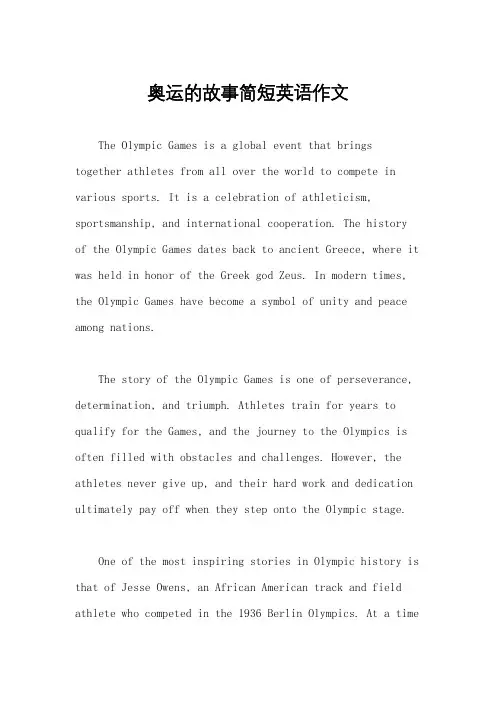
奥运的故事简短英语作文The Olympic Games is a global event that brings together athletes from all over the world to compete in various sports. It is a celebration of athleticism, sportsmanship, and international cooperation. The history of the Olympic Games dates back to ancient Greece, where it was held in honor of the Greek god Zeus. In modern times, the Olympic Games have become a symbol of unity and peace among nations.The story of the Olympic Games is one of perseverance, determination, and triumph. Athletes train for years to qualify for the Games, and the journey to the Olympics is often filled with obstacles and challenges. However, the athletes never give up, and their hard work and dedication ultimately pay off when they step onto the Olympic stage.One of the most inspiring stories in Olympic history is that of Jesse Owens, an African American track and field athlete who competed in the 1936 Berlin Olympics. At a timewhen racism and discrimination were rampant, Owens defied the odds and won four gold medals, becoming a symbol of hope and resilience for people around the world.Another iconic moment in Olympic history is the 1980 "Miracle on Ice" when the United States ice hockey team defeated the heavily favored Soviet Union team in the semifinals of the Winter Olympics. The victory was a testament to the power of teamwork and determination, andit inspired a nation during a time of political tension and uncertainty.In recent years, the Olympic Games have continued to showcase incredible stories of triumph and perseverance. From Michael Phelps' record-breaking 23 gold medals in swimming to Usain Bolt's electrifying performances in track and field, the Games have been a platform for athletes to showcase their extraordinary talents and inspire people of all ages.The Olympic Games also serve as a reminder of the power of sports to unite people from different backgrounds andcultures. The Games bring together athletes and spectators from around the world, fostering a spirit of camaraderie and mutual respect. In a world often divided by political and social conflicts, the Olympic Games provide a rare opportunity for people to come together and celebrate the values of friendship, excellence, and respect.In conclusion, the story of the Olympic Games is a testament to the human spirit and the power of sports to inspire and unite people. The Games have produced countless memorable moments and iconic athletes, and they continue to be a symbol of hope and unity for people around the world. As we look forward to the next Olympic Games, we can be sure that they will continue to showcase the best of what humanity has to offer.。
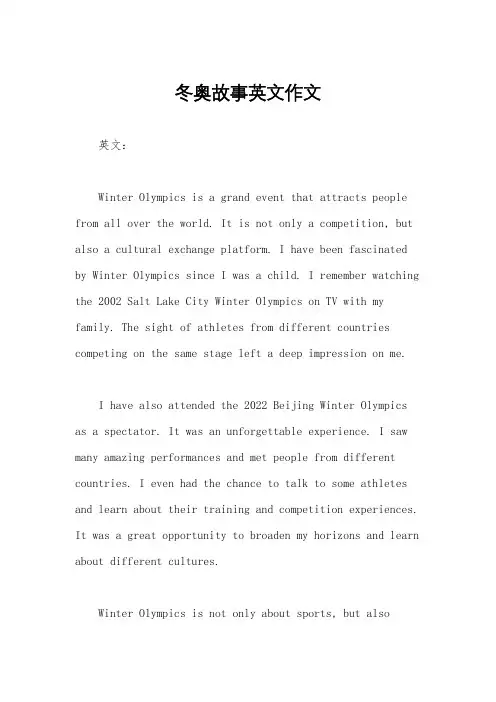
冬奥故事英文作文英文:Winter Olympics is a grand event that attracts people from all over the world. It is not only a competition, but also a cultural exchange platform. I have been fascinated by Winter Olympics since I was a child. I remember watching the 2002 Salt Lake City Winter Olympics on TV with my family. The sight of athletes from different countries competing on the same stage left a deep impression on me.I have also attended the 2022 Beijing Winter Olympics as a spectator. It was an unforgettable experience. I saw many amazing performances and met people from different countries. I even had the chance to talk to some athletes and learn about their training and competition experiences. It was a great opportunity to broaden my horizons and learn about different cultures.Winter Olympics is not only about sports, but alsoabout the spirit of perseverance and dedication. Athletes train for years to compete in the Olympics, and their hard work and determination inspire people all over the world. The Winter Olympics also promotes peace and cooperation among countries, as athletes from different nations come together to compete in a friendly and respectful manner.中文:冬奥会是一个吸引世界各地人们的盛大活动。
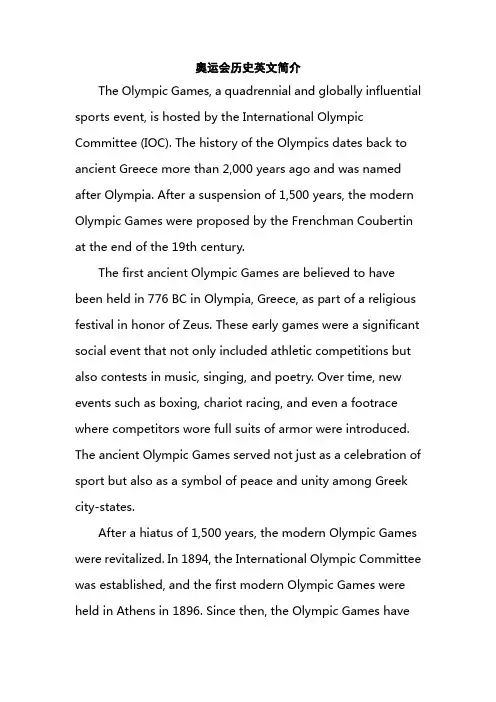
奥运会历史英文简介The Olympic Games, a quadrennial and globally influential sports event, is hosted by the International Olympic Committee (IOC). The history of the Olympics dates back to ancient Greece more than 2,000 years ago and was named after Olympia. After a suspension of 1,500 years, the modern Olympic Games were proposed by the Frenchman Coubertin at the end of the 19th century.The first ancient Olympic Games are believed to have been held in 776 BC in Olympia, Greece, as part of a religious festival in honor of Zeus. These early games were a significant social event that not only included athletic competitions but also contests in music, singing, and poetry. Over time, new events such as boxing, chariot racing, and even a footrace where competitors wore full suits of armor were introduced. The ancient Olympic Games served not just as a celebration of sport but also as a symbol of peace and unity among Greek city-states.After a hiatus of 1,500 years, the modern Olympic Games were revitalized. In 1894, the International Olympic Committee was established, and the first modern Olympic Games were held in Athens in 1896. Since then, the Olympic Games havegrown into a global event involving thousands of athletes from over 200 countries and regions, competing across various sports.In addition to the Summer Olympic Games, the Winter Olympic Games were introduced in 1924, followed by the Paralympic Games in 1960 and the Youth Olympic Games in 2010. These developments enriched the Olympic family and promoted the spirit of the Olympics across different groups and age ranges.The Olympics have not only evolved in terms of the number of participants and events but also in their organization and presentation. For instance, the 2024 Paris Olympics will see several innovations, including gender equality in participation, new sports such as breaking (霹雳舞), and cultural integration with the host city. The opening ceremony will take place on the Seine River instead of the traditional stadium setting, showcasing the integration of sports with the city's culture and environment.The significance of the Olympic Games lies not only in promoting sporting excellence but also in fostering mutual understanding, friendship, and peace among nations through sports. With the IOC's efforts, the Olympic spirit continues toinspire people worldwide, promoting not just physical health but also moral advancement and international cooperation.In conclusion, the history of the Olympic Games is a journey of evolution and innovation, reflecting humanity's continuous pursuit of peace, excellence, and cooperation. From its ancient origins to its modern grandeur, the Olympics stand as a testament to human potential and achievement when guided by the principles of fair competition, mutual understanding, and solidarity.。
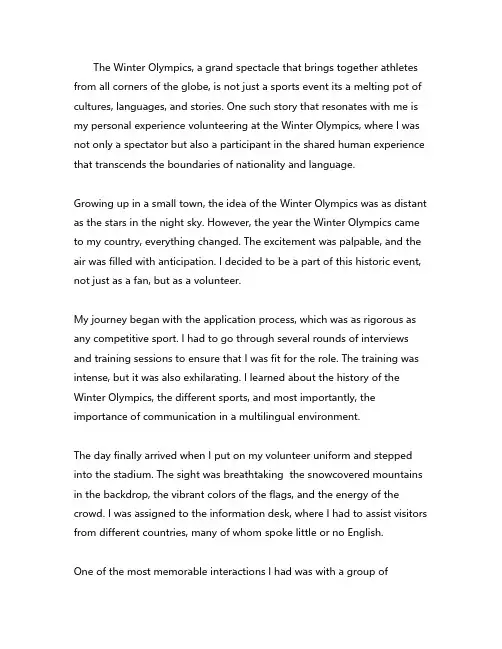
The Winter Olympics, a grand spectacle that brings together athletes from all corners of the globe, is not just a sports event its a melting pot of cultures, languages, and stories. One such story that resonates with me is my personal experience volunteering at the Winter Olympics, where I was not only a spectator but also a participant in the shared human experience that transcends the boundaries of nationality and language.Growing up in a small town, the idea of the Winter Olympics was as distant as the stars in the night sky. However, the year the Winter Olympics came to my country, everything changed. The excitement was palpable, and the air was filled with anticipation. I decided to be a part of this historic event, not just as a fan, but as a volunteer.My journey began with the application process, which was as rigorous as any competitive sport. I had to go through several rounds of interviews and training sessions to ensure that I was fit for the role. The training was intense, but it was also exhilarating. I learned about the history of the Winter Olympics, the different sports, and most importantly, the importance of communication in a multilingual environment.The day finally arrived when I put on my volunteer uniform and stepped into the stadium. The sight was breathtaking the snowcovered mountains in the backdrop, the vibrant colors of the flags, and the energy of the crowd. I was assigned to the information desk, where I had to assist visitors from different countries, many of whom spoke little or no English.One of the most memorable interactions I had was with a group ofJapanese tourists. They were trying to find their seats but were having difficulty due to the language barrier. I approached them with a smile and offered my assistance. Using a mix of English, hand gestures, and the few Japanese phrases I had picked up, I was able to guide them to their seats. Their faces lit up with gratitude, and they thanked me profusely. It was a small act, but it made a significant impact on me. It was a testament to the power of communication and the universal language of kindness.Another story that stands out is that of a young athlete from a developing country. He was competing in the skiing event and was visibly nervous. I struck up a conversation with him, and he shared his story with me. He had trained for years, overcoming numerous obstacles, just to be here. His dream was to represent his country and make his family proud. His story was inspiring, and I wished him the best of luck.As the days went by, I witnessed numerous such stories stories of determination, resilience, and the pursuit of dreams. The athletes, regardless of their nationality or language, shared a common goal to excel in their sport and bring glory to their country.The Winter Olympics was not just about the sports it was about the stories that unfolded behind the scenes. It was about the friendships that were forged, the barriers that were broken, and the dreams that were chased. It was a celebration of diversity, unity, and the indomitable human spirit.As a volunteer, I was a part of this incredible journey. I learned about different cultures, made new friends, and most importantly, I discoveredthe power of communication. The experience was humbling and eyeopening. It taught me that despite our differences, we all share a common humanity.In conclusion, the Winter Olympics was a onceinalifetime experience that I will cherish forever. It was a reminder that we are all connected, and our stories, no matter how different they may seem, are all part of the same tapestry of life. It was a testament to the power of sports to bring people together, to inspire, and to create lasting memories.。
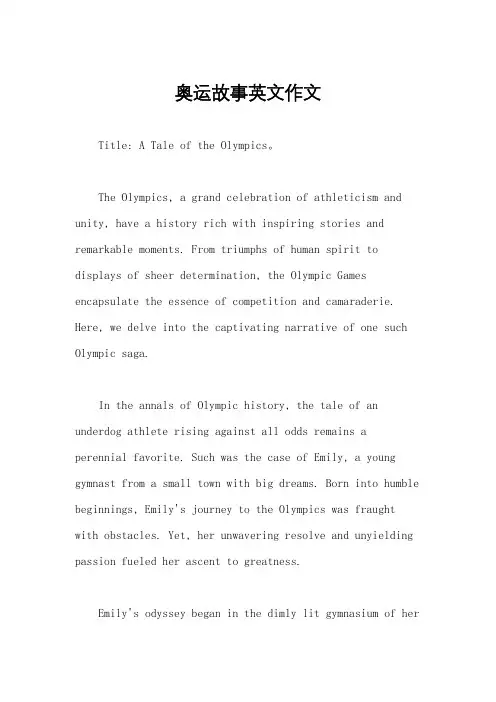
奥运故事英文作文Title: A Tale of the Olympics。
The Olympics, a grand celebration of athleticism and unity, have a history rich with inspiring stories and remarkable moments. From triumphs of human spirit to displays of sheer determination, the Olympic Games encapsulate the essence of competition and camaraderie. Here, we delve into the captivating narrative of one such Olympic saga.In the annals of Olympic history, the tale of an underdog athlete rising against all odds remains a perennial favorite. Such was the case of Emily, a young gymnast from a small town with big dreams. Born into humble beginnings, Emily's journey to the Olympics was fraught with obstacles. Yet, her unwavering resolve and unyielding passion fueled her ascent to greatness.Emily's odyssey began in the dimly lit gymnasium of herhometown, where she first discovered her love for gymnastics. With each graceful leap and precise rotation, she felt a sense of liberation, as if defying theconstraints of her circumstances. Despite lacking access to state-of-the-art facilities and renowned coaches, Emily poured her heart and soul into honing her craft.As Emily's talent blossomed, so did her ambitions. She set her sights on the ultimate stage: the Olympic Games. However, the path to Olympic glory was riddled with formidable challenges. From grueling training sessions to relentless competition, Emily faced setbacks that testedher resolve. Yet, with each setback, she emerged stronger and more determined than ever.The road to the Olympics is often paved with sacrifices, and Emily's journey was no exception. Countless hours were spent perfecting her routines, sacrificing leisure andsocial outings for the pursuit of excellence. Yet, amidstthe sweat and tears, Emily found solace in her unwavering dedication to her craft.Finally, the moment of truth arrived as Emily stepped onto the hallowed grounds of the Olympic arena. The air crackled with anticipation as spectators from around the world watched in awe. With nerves of steel and fire in her eyes, Emily embarked on her quest for Olympic glory.The competition was fierce, with the world's finest athletes vying for supremacy. Yet, amidst the sea of talent, Emily stood out with her grace and poise. With each mesmerizing routine, she captivated the audience and judges alike, earning admiration and applause.As the final scores were tallied, Emily's heart raced with anticipation. Would her years of dedication and sacrifice culminate in Olympic glory? The moment of reckoning arrived as her name echoed through the arena: Emily, Olympic champion.Tears of joy streamed down Emily's face as she stood atop the podium, her country's flag fluttering proudlyabove her. In that moment, all the trials and tribulations faded into insignificance, replaced by the sweet ecstasy ofvictory.Yet, amidst the euphoria of her triumph, Emily remained humble and grounded. For her, the true essence of the Olympics lay not in the medals won, but in the spirit of unity and sportsmanship that transcended borders and cultures.In the end, Emily's Olympic journey was more than a mere sporting achievement; it was a testament to the power of perseverance, passion, and the human spirit. And as her story reverberated across the globe, it served as an inspiration to aspiring athletes everywhere, proving that with unwavering determination, anything is possible on the grandest stage of all—the Olympic Games.。
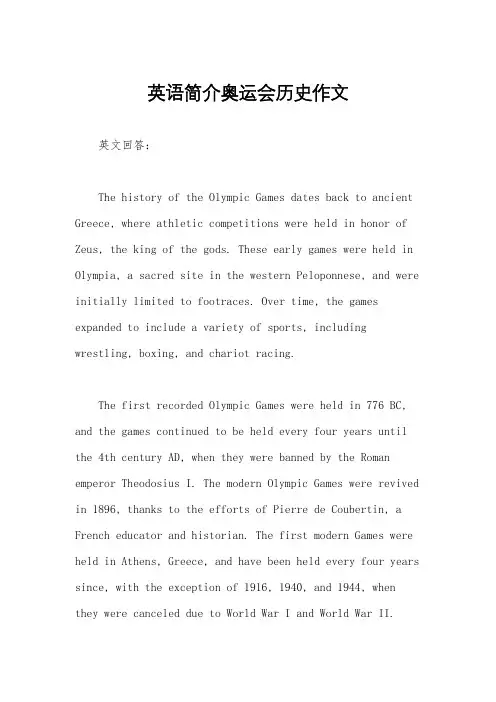
英语简介奥运会历史作文英文回答:The history of the Olympic Games dates back to ancient Greece, where athletic competitions were held in honor of Zeus, the king of the gods. These early games were held in Olympia, a sacred site in the western Peloponnese, and were initially limited to footraces. Over time, the games expanded to include a variety of sports, including wrestling, boxing, and chariot racing.The first recorded Olympic Games were held in 776 BC, and the games continued to be held every four years until the 4th century AD, when they were banned by the Roman emperor Theodosius I. The modern Olympic Games were revived in 1896, thanks to the efforts of Pierre de Coubertin, a French educator and historian. The first modern Games were held in Athens, Greece, and have been held every four years since, with the exception of 1916, 1940, and 1944, when they were canceled due to World War I and World War II.The Olympic Games have grown to become the world's largest sporting event, with athletes from over 200countries competing in over 30 sports. The Games are a celebration of human achievement and a symbol of unity and friendship among nations.Here are some interesting facts about the Olympic Games:The Olympic flame is lit in Olympia, Greece, and then carried by torchbearers to the host city.The Olympic motto is "Citius, Altius, Fortius," which means "Faster, Higher, Stronger."The Olympic rings represent the five continents of the world.The Olympic Games have been held in 28 differentcities around the world.The most successful Olympian is Michael Phelps, aswimmer from the United States, who has won 28 Olympic medals.中文回答:奥运会起源于古希腊,运动员们举行竞技比赛以向宙斯,众神之王致敬。
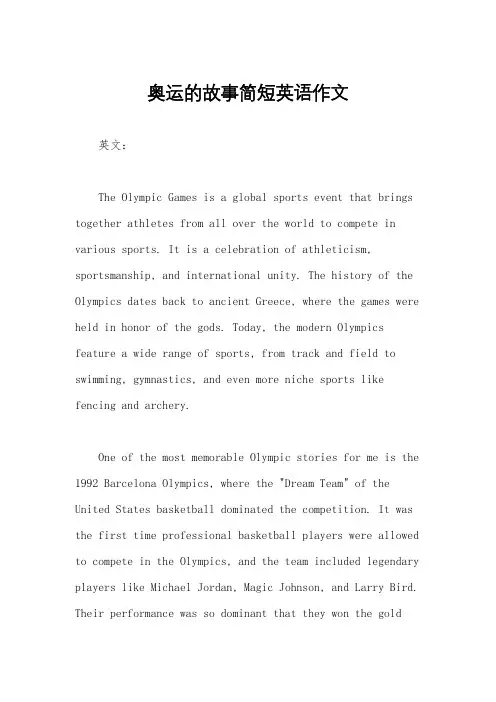
奥运的故事简短英语作文英文:The Olympic Games is a global sports event that brings together athletes from all over the world to compete in various sports. It is a celebration of athleticism, sportsmanship, and international unity. The history of the Olympics dates back to ancient Greece, where the games were held in honor of the gods. Today, the modern Olympics feature a wide range of sports, from track and field to swimming, gymnastics, and even more niche sports like fencing and archery.One of the most memorable Olympic stories for me is the 1992 Barcelona Olympics, where the "Dream Team" of the United States basketball dominated the competition. It was the first time professional basketball players were allowed to compete in the Olympics, and the team included legendary players like Michael Jordan, Magic Johnson, and Larry Bird. Their performance was so dominant that they won the goldmedal without ever being seriously challenged. It was a historic moment for basketball and for the Olympics as a whole.Another inspiring story is that of Usain Bolt, the Jamaican sprinter who became a global sensation at the 2008 Beijing Olympics. Bolt broke world records in the 100m and 200m sprints, and his charisma and showmanship made him a fan favorite. His performances were not just about winning gold medals, but also about entertaining and inspiring people around the world. He became a symbol of the Olympic spirit and the power of sports to unite people across cultures and languages.中文:奥运会是一个全球性的体育赛事,汇集了来自世界各地的运动员在各种运动项目中竞争。
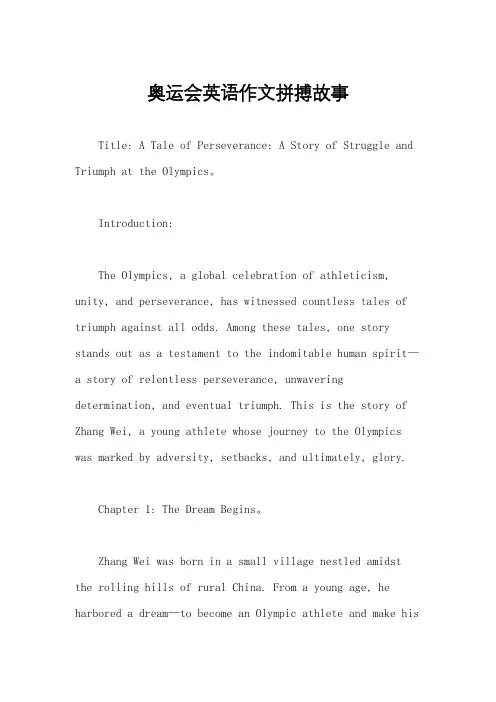
奥运会英语作文拼搏故事Title: A Tale of Perseverance: A Story of Struggle and Triumph at the Olympics。
Introduction:The Olympics, a global celebration of athleticism, unity, and perseverance, has witnessed countless tales of triumph against all odds. Among these tales, one story stands out as a testament to the indomitable human spirit—a story of relentless perseverance, unwavering determination, and eventual triumph. This is the story of Zhang Wei, a young athlete whose journey to the Olympics was marked by adversity, setbacks, and ultimately, glory.Chapter 1: The Dream Begins。
Zhang Wei was born in a small village nestled amidst the rolling hills of rural China. From a young age, he harbored a dream—to become an Olympic athlete and make hiscountry proud. With unyielding determination and unwavering resolve, Zhang Wei embarked on his journey, fueled by the belief that with hard work and perseverance, anything was possible.Chapter 2: The Roadblocks。
奥运会英语作文加翻译奥运会英语作文加翻译让你有更好的阅读体验。
下面是小编给大家整理的奥运会英语作文加翻译的相关知识,供大家参阅!奥运会英语作文加翻译篇1 Olympic Games as the Olympic Games,which will include Xiaao,the Olympic and Paralympic Games,Green Olympics and Special Olympics.International Olympic Committee is sponsored by the project include a variety of international sports games,held once every four years.The first Olympic Games originated in ancient Greece (776 BC),due to held in Olympia named.The end of the 19th century by the French Baron Coubertin founded the true sense of the modern Olympic Games.中文:奥林匹克运动会简称奥运会,它包括夏奥会、冬奥会、残奥会、青奥会和特奥会.是国际奥林匹克委员会主办的包含多种体育运动项目的国际性运动会,每四年举行一次.奥林匹克运动会最早起源于古希腊(公元前776年),因举办地在奥林匹亚而得名.19世纪末由法国的顾拜旦男爵创立了真正意义上的现代奥林匹克运动会.奥运会英语作文加翻译篇2 Olympic Games,international athletic competition,held every four years at a different city site.A modified revival of the Olympian Games,the OlympicGames were inaugurated in the spring of 1896,largely through the efforts of the French sportsman and educator Baron Pierre de Coubertin.This competition evolved into the Summer Olympicsthe subject of this article.The Winter Olympics began in 1924 and were held in the same year as the Summer Olympics until 1994,since when the winter games have alternated with the summer games in even-numbered years.奥运,国际体育竞赛,每四年举行一次,在不同的城市的网站.一种改进的复苏奥神比赛中,奥运会上被正式成立,在1896年的春天,主要是通过努力,法国运动员和教育家男爵皮埃尔德顾拜旦.这种竞争演变成夏季奥运会的主题这篇文章.冬季奥运会开始于1924年,并举行了在同一年,作为夏季奥运会,直到1994年,因为当冬季运动会有交替与夏季奥运会在偶数年.奥运会英语作文加翻译篇3Chinese people always appreciate the purposes and principles of Olympic ideal, support the efforts of Olympic Games to promote world peace. The Chinese Government and people are doing our the utmost/best to prepare for the 2008 Olympic Games in Beijing, and shooting at the pageant with advocating Olympic ideal, sparkpluging world peace and enhancing the relationships among the world. Olympic spirit are gonna spread again in orient cultural ancient China.The government and people of China have always admired the purposes and principles of the Olympic spirit and supported the efforts made by the Olympics in promoting world peace. The Chinese government and people are doing our utmost in preparation for the 2008 Olympics in Beijing. It is our hope to make it a grand gathering that will carry forward the Olympic spirit, promote world peace and enhance the friendship among people of the world, so that the Olympic spirit will flourish once again, this time in China, an oriental country with an ancient civilization.中国人民始终欣赏的宗旨和原则,奥林匹克理想,支持的努力,奥运会上为促进世界和平。
奥运的故事简短英语作文下载温馨提示:该文档是我店铺精心编制而成,希望大家下载以后,能够帮助大家解决实际的问题。
文档下载后可定制随意修改,请根据实际需要进行相应的调整和使用,谢谢!并且,本店铺为大家提供各种各样类型的实用资料,如教育随笔、日记赏析、句子摘抄、古诗大全、经典美文、话题作文、工作总结、词语解析、文案摘录、其他资料等等,如想了解不同资料格式和写法,敬请关注!Download tips: This document is carefully compiled by theeditor. I hope that after you download them,they can help yousolve practical problems. The document can be customized andmodified after downloading,please adjust and use it according toactual needs, thank you!In addition, our shop provides you with various types ofpractical materials,such as educational essays, diaryappreciation,sentence excerpts,ancient poems,classic articles,topic composition,work summary,word parsing,copyexcerpts,other materials and so on,want to know different data formats andwriting methods,please pay attention!Once upon a time, there was a young athlete named Alex. He had always dreamed of participating in the Olympics and winning a gold medal. His passion for sports was evident from a very young age, and he dedicated all his time and energy to training.Alex's journey to the Olympics was not an easy one. He faced numerous challenges and setbacks along the way. There were times when he felt discouraged and wanted to give up. However, his determination and perseverance kept him going. He knew that success would not come overnight, and he was willing to put in the hard work and sacrifice needed to achieve his goals.Finally, the day of the Olympics arrived. Alex wasfilled with a mix of excitement and nervousness. He had trained for years for this moment, and now it was finally here. As he stepped onto the field, he could feel the adrenaline coursing through his veins. All his training andsacrifices had led him to this point, and he was determined to give it his all.The competition was fierce, with athletes from all around the world showcasing their skills and talents. Alex knew that he had to bring his A-game if he wanted to stand a chance. He pushed himself to the limit, giving each event his absolute best. The crowd cheered him on, their energy fueling his determination.In the end, Alex's hard work paid off. He won a gold medal in his chosen sport, fulfilling his lifelong dream. The feeling of accomplishment and pride overwhelmed him as he stood on the podium, the national anthem playing in the background. It was a moment he would cherish forever.The Olympics taught Alex many valuable lessons. It taught him the importance of perseverance, dedication, and never giving up on his dreams. It showed him that hard work and determination can lead to success, no matter how challenging the journey may be. The Olympics also brought people from different countries and cultures together,promoting unity and friendship.As the closing ceremony came to an end, Alex couldn't help but feel a sense of gratitude and fulfillment. The Olympics had been a life-changing experience for him, one that he would carry with him for the rest of his life. He knew that this was just the beginning of his journey, and he was excited to see where it would take him next.And so, the story of Alex and his Olympic journey came to a close. It was a story of passion, determination, and the power of dreams. Alex had proven that with hard work and perseverance, anything is possible. He had inspired countless others to chase their dreams and never give up. The Olympics had truly changed his life, and he was grateful for every moment of it.。
我的奥运故事英文作文英文:My Olympic Story。
The Olympics is one of the biggest sporting events in the world and I have always been a fan of it. I have been lucky enough to attend two Olympic Games, one in Beijing and one in Rio de Janeiro. It was an incredible experience that I will never forget.In Beijing, I was able to witness the opening ceremony in person. The atmosphere was electric and the show was absolutely stunning. I remember feeling so proud to be a part of such a historic event. The highlight of the games for me was watching Michael Phelps win eight gold medals in swimming. It was amazing to see him break so many records and become one of the greatest Olympians of all time.In Rio de Janeiro, I was able to attend a few differentevents, including beach volleyball and track and field. The energy in the stadiums was contagious and it was so muchfun to cheer on the athletes. One of my favorite momentswas watching Usain Bolt win the 100m dash for the thirdtime in a row. The crowd went wild and it was a moment that I will never forget.Overall, attending the Olympics was an unforgettable experience. It was amazing to be a part of something so big and to witness so many incredible moments in sports history.中文:我的奥运故事。
奥运会小故事英语作文Title: A Tale of Olympic Glory and Perseverance.The Olympics, a grand stage where athletes from around the globe gather to compete in the spirit of unity and excellence. It's a testament to human potential, a display of courage, determination, and pure passion. Among these stories of glory and triumph, there are also tales of heartbreak, struggle, and perseverance.One such story is that of athlete Emily Johnson. Born and raised in a small town in the United States, Emily had always been an outstanding runner. Her childhood was filled with countless races and medals, but her dream was always bigger than the local circuit. She dreamed of representing her country at the Olympics, a dream that seemed impossible given her humble beginnings.Emily's journey to the Olympics was not without its challenges. She faced financial constraints, lack ofresources, and a constant battle against self-doubt. She trained alone, often in treacherous weather conditions, with no coach or sponsors to guide her. Her determination, however, was unwavering. She rose early, trained late, and sacrificed everything to pursue her dream.Years of hard work and dedication finally paid off when Emily qualified for the Olympics. It was a moment of pure joy and relief, but also a new challenge. She faced the prospect of competing against the world's best athletes, many of whom had years of experience and access to elite training facilities. Emily, with her limited resources and no professional background, seemed an unlikely contender.However, Emily's spirit was not one to be daunted. She believed in herself, in her hard work, and in her dream. She trained even harder, focusing on her strengths and ignoring the doubts that crept into her mind. Shevisualized herself winning, felt the rush of adrenaline, and imagined the look of pure joy on her face when she crossed the finish line first.The day of the race finally arrived, and Emily was nervous but ready. She stood on the starting line, heart pounding, adrenaline surging. The gun went off, and she was off, her legs carrying her forward with惊人的速度. She heard the crowd cheering, felt the wind in her hair, and ignored the pain in her legs. She pushed herself harder, faster, further than she ever had before.As the final stretch approached, Emily could see the finish line. She dug deep, found a last burst of speed, and crossed the line first. She collapsed in a heap, tears streaming down her face. She had done it. She had won. She had achieved her dream.Emily's story is an inspiration to us all. It teaches us that with enough hard work, perseverance, and belief in oneself, any dream is possible. She overcame obstacles, faced her fears, and emerged victorious. She is a true Olympian, a testament to the spirit of the Olympics, and a reminder that we all have the potential to achieve greatness if we are willing to put in the effort and never give up.Emily's victory was not just about a gold medal. It was about her journey, her perseverance, and her belief in herself. It was about overcoming the impossible and achieving her dream. It was a story of Olympic glory and perseverance that will inspire generations to follow their dreams and never give up.。
关于冬奥会的故事英语作文Paragraph 1:Wow, the Winter Olympics is such an incredible event! The energy and excitement in the air are absolutely contagious. Athletes from all over the world gather here to showcase their skills and compete for glory. It's a true celebration of sportsmanship and human achievement.Paragraph 2:I remember watching the figure skating competition. The skaters gracefully gliding across the ice, performing breathtaking jumps and spins. The crowd erupts in applause with every flawless move. It's truly mesmerizing to witness the dedication and talent of these athletes.Paragraph 3:The skiing events are also a sight to behold. The speedand precision with which the skiers navigate through the slopes is mind-boggling. It's like they're defying gravity, effortlessly maneuvering their way down the mountain. It's a thrilling experience just watching them fly down the slopes.Paragraph 4:The bobsleigh races are intense! The athletes hurtle down the icy track at incredible speeds, relying on their teamwork and coordination to make it to the finish line. The adrenaline rush must be unimaginable. It's a true test of strength, skill, and trust in your teammates.Paragraph 5:One of the most heartwarming moments of the Winter Olympics is the closing ceremony. Athletes from different countries come together, waving their flags and celebrating their accomplishments. It's a beautiful display of unity and camaraderie, reminding us that sports have the power to bring people together.Paragraph 6:But let's not forget about the fans! The Winter Olympics brings people from all walks of life together, creating a vibrant atmosphere of support and enthusiasm. The cheers and chants from the stands are deafening, creating an electric atmosphere that fuels the athletes' performances. It's truly a testament to the power of sports to unite people.Paragraph 7:The Winter Olympics is not just about the competitions, it's also about the host city showcasing its culture and traditions. From the opening ceremony to the various cultural events, the host city takes center stage, offering a glimpse into its rich heritage. It's a wonderful opportunity for people from around the world to learn and appreciate different cultures.Paragraph 8:As the Winter Olympics come to an end, we're left with memories that will last a lifetime. The triumphs, the defeats, the moments of pure joy and heartbreak – they all contribute to the magic of this event. The Winter Olympics is not just a sporting event, it's a celebration of the human spirit and the pursuit of excellence.。
关于冬奥会故事英语作文It was a cold and snowy day, the kind of day that makes you want to stay inside and curl up with a hot cup of cocoa. But for the athletes competing in the Winter Olympics,there was no time for cozying up by the fire. They were out on the slopes, giving it their all in pursuit of Olympic glory.As the sun set behind the mountains, the stadium lights flickered to life, casting a warm glow over the ice rink. The figure skaters took to the ice, their graceful movements and dazzling costumes mesmerizing the crowd. Each jump and spin seemed to defy gravity, leaving the audience breathless with anticipation.Meanwhile, over at the ski jump, the air was filledwith the sound of skis slicing through the icy wind. The athletes hurtled down the ramp, soaring through the airwith the grace of birds in flight. The crowd held itsbreath as each competitor landed, their fate determined bythe slightest shift in balance.In the speed skating arena, the athletes raced around the oval, their blades cutting deep into the ice. The speed and power of their movements was awe-inspiring, as they pushed their bodies to the limit in pursuit of the finish line.Back in the snow-covered mountains, the biathletes took aim at the targets, their breath forming clouds in the frigid air. The crack of gunfire echoed through the valley as they took their shots, their focus unwavering despite the physical exertion of the race.And in the cozy warmth of the curling rink, the teams strategized and swept, their brooms swishing back and forth as they guided the stones towards the target. The precision and teamwork on display was a sight to behold, as the players worked together to outmaneuver their opponents.As the final events came to a close, the athletes gathered in the stadium for the closing ceremony. The airwas filled with a sense of camaraderie and achievement, as they celebrated the culmination of their hard work and dedication. And as the Olympic flame was extinguished, the world looked on with admiration and respect for these incredible athletes who had given their all in the pursuit of greatness.。
The Story of the Olympic Games
A Journey to Ancient Greece
No one is sure how the Olympic
Games really began, but the first
recorded event took place in
Olympia about 3000 years ago. Olympia was in the south west of Greece. It was a beautiful area, surrounded by olive groves. Many people
came to visit
Olympia to
worship Zeus
and his wife
Hera; the king
and queen of
the Greek gods.
Some people believe that the games were started by Zeus’s son, who was the Greek hero Herakles.
You may know him better by the
name the Roman’s gave him:
Hercules.
Some believe that the games were in memory of Prince Pelops of Lydia, who was famous for his
chariot racing.
It is most likely that the Olympic games began as
part of a religious festival, which took place in Olympia, in
honour of Zeus.
At first there was only one
event; a running race.
The track was wide enough for 20 people to run comfortably side by side. It was also long (190m) and
straight.
Only men took part in the games: women who wanted to race had a separate festival called the
Heraia.
Married women were not even allowed to watch the games –only men and unmarried women!
Traditionally, the Greek athletes were naked as they competed. If gave them a chance to show off their
muscular bodies.
From 776BC the games were held at Olympia every four years, usually in August. The four year time span was called an Olympiad.
The games proved
very popular.
Spectators came
from other
countries nearby –
including Italy,
Syria and Egypt.
In 456BC the Temple of Zeus was completed at Olympia. This brought even more people to the games as they all wanted to see the magnificent statue of
Zeus that was inside! The statue was 13m tall!
After 100 years of the Games
the original running race had
been added to, and there were 18
events that took place. The first event was the chariot race and one of the most popular events was the pentathlon, which was made up of five different sporting
activities.
These were running, wrestling, the long jump,
the javelin and the discus.
In the modern Olympics, winners are presented with medals in gold, silver and bronze, but, in ancient Greece, winners were awarded a crown of
olive leaves.
Then he ordered his soldiers to destroy the Temple of Zeus.
The Olympic Games continued for many years but in 393AD, 1,166 years after they first began, a Roman Emperor named Theodosius I banned them.
It remained hidden for more than 1000 years and there wasn’t another Olympic Games until 1896.
Olympia fell into ruin. There was an earthquake and a flood and the original ruins were buried and hidden underground
This time the Olympics were international and took place in the Greek city of Athens .
The idea of a modern Olympic
Games was started by a
Frenchman called Baron Pierre
de Coubertin.
He designed the famous logo
with five coloured rings.
These represent the
continents of the world
joined in peace and harmony.
De Coubertin also wrote the Olympic
creed, which explained what he thought the Olympics were all about.
Months before the Olympics
begin a flame is lit in Olympia and
is passed through a relay of
torches.
The torches are carried by
foot, air, road, rail or water
to the chosen stadium.
During the opening
ceremony the last torch
lights a cauldron, which
burns throughout the Games
A flame was kept burning during
the ancient Games as well!
The Olympics are now the biggest
sporting event in the world .
There are many more events and sports to participate in and there is even a separate Winter
Games every four years.
Only time will tell if the modern Games can carry on for as long as the ancient ones!
Clip Art ©Phillip Martin, 2006
/clipart/homepage.htm, Additional Clip Art ©Paddy Mounter,
2008 and Bev Evans
Presentation ©Bev Evans, 2008,。